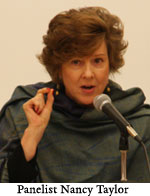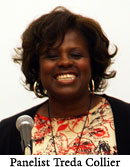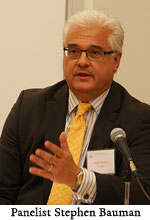How can Yale Divinity School prepare students for Christian ministry and leadership that is creative and responsive to a changing, pluralistic world, while also grounding them in the theological, ethical, and liturgical roots of their faith?
 This question, put forward by Professor Robert Wilson, encapsulated the recommendations and concerns of panel members gathered for the Convocation panel “What Should YDS Be Preparing Students For?” Joining Wilson, Hoober Professor of Religious Studies and Professor of Old Testament, were Stephen Bauman ‘79 M.Div., senior minister of Christ Church in NYC; Stephen Carlsen, Dean of Christ Church Indianapolis and a trustee of Berkeley Divinity School; Treda Collier, a fifth year M.Div. student; Willis Jenkins, Margaret Farley Associate Professor of Social Ethics; and Nancy Taylor ‘81 M.Div., senior minister of Old South Church in Boston.
This question, put forward by Professor Robert Wilson, encapsulated the recommendations and concerns of panel members gathered for the Convocation panel “What Should YDS Be Preparing Students For?” Joining Wilson, Hoober Professor of Religious Studies and Professor of Old Testament, were Stephen Bauman ‘79 M.Div., senior minister of Christ Church in NYC; Stephen Carlsen, Dean of Christ Church Indianapolis and a trustee of Berkeley Divinity School; Treda Collier, a fifth year M.Div. student; Willis Jenkins, Margaret Farley Associate Professor of Social Ethics; and Nancy Taylor ‘81 M.Div., senior minister of Old South Church in Boston.
|
“It’s not just about worship, it’s also social justice and training for a diverse world.” Treda Collier ‘13 M.Div. |
In their opening remarks, panelists spoke to a need for both adherence to tradition and innovation in education and professional life. Collier, a second-career student who previously worked in education, called for YDS to embrace a broad understanding of ministerial formation: “It’s not just about worship, it’s also social justice and training for a diverse world.” To that end, she said, she has taken courses that cover foundational teachings as well as classes in the School of Management and requirements for the Educational Leadership in Ministry certificate.
 Jenkins echoed Collier’s recommendations. “I’m teaching classes that allow people to develop pastoral imagination and professional skills,” he noted, describing cross-disciplinary classes that incorporate ethics, environmental science, sociology, and pastoral care. These opportunities both allow students to engage in vocational discernment and examine what religious leaders can uniquely offer to meet community needs. Collier noted that she had benefited from opportunities such as these: “After 25 years in education, I’m not sure what’s ahead. I thought I’d be a chaplain, but now I’m going through licensing for the American Baptist Church, and supply preaching. I’m more open.”
Jenkins echoed Collier’s recommendations. “I’m teaching classes that allow people to develop pastoral imagination and professional skills,” he noted, describing cross-disciplinary classes that incorporate ethics, environmental science, sociology, and pastoral care. These opportunities both allow students to engage in vocational discernment and examine what religious leaders can uniquely offer to meet community needs. Collier noted that she had benefited from opportunities such as these: “After 25 years in education, I’m not sure what’s ahead. I thought I’d be a chaplain, but now I’m going through licensing for the American Baptist Church, and supply preaching. I’m more open.”
 Reflecting on his ministry since YDS, Bauman agreed that graduates should be prepared to work with partners, and talked about his involvement with various non-profits and an Abrahamic faith leaders’ group. He also emphasized the need for YDS to be “explicit, confident, and self-aware” of its role in training students for professional, ethical leadership, whatever their ultimate work.
Reflecting on his ministry since YDS, Bauman agreed that graduates should be prepared to work with partners, and talked about his involvement with various non-profits and an Abrahamic faith leaders’ group. He also emphasized the need for YDS to be “explicit, confident, and self-aware” of its role in training students for professional, ethical leadership, whatever their ultimate work.
Focusing explicitly on church leadership, Taylor offered her observations about a changing religious experience: “We can’t assume that people have faith…our job is to bring people to faith.” She described the need to see oneself as an evangelist and apologist, working to teach and interpret the Christian experience for a new generation of churchgoers who are committed to their faith but not necessarily well-versed in theology or the Bible. Carlsen similarly emphasized his understanding of contemporary ministry as celebrating the legacies of Christian doctrine and worship, while also responding proactively to cultural changes over the last 15 years.
In response to Wilson’s question, several panel members suggested a combined emphasis of focus on the basics and seeking out methods of collaboration and exploration outside the traditional bounds of religious education and ministry.
|
“We can’t assume that people have faith … our job is to bring people to faith.” Nancy Taylor ‘81 M.Div. |
Bauman noted his shift towards a “leaner” style of pastoring, agreeing with Taylor’s assessment of congregations as sites of Christian education and describing how he provides “a consistent word shared in all settings.” Collier affirmed the need for integrity in worship and other forms of ministry but argued that YDS students should also receive training in teambuilding, diversity, self-awareness, and communication across lines of difference. She cited the recent school-wide training on race as an example of relevant and necessary formation for ministerial and other leaders.
While emphasizing different facets of the relationship between tradition and innovation, panelists generally agreed that YDS strives for a healthy balance, with room for student growth and exploration. Carlsen noted that the YDS graduates he works with are ready to greet the challenges posed by an evolving religious climate: “I don’t want pure church people who don’t see how the church and the world is changing…People here see that change and live it.”
| Attachment | Size |
|---|---|
| 3.36 KB |